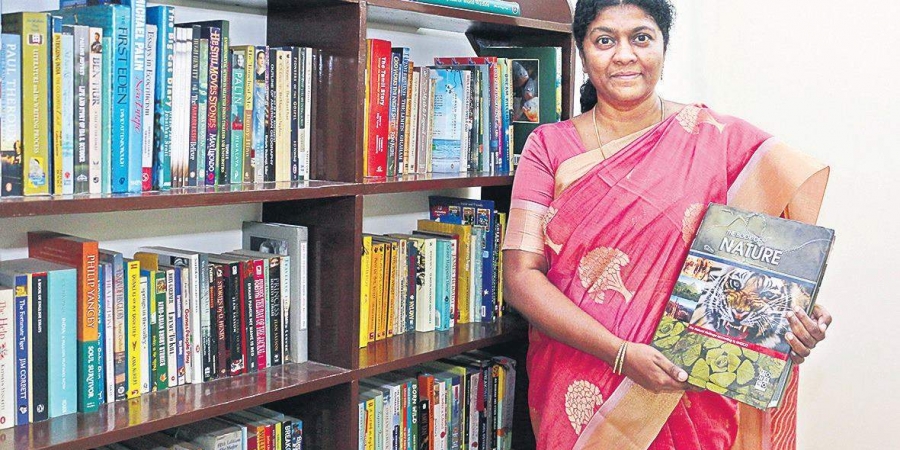A Natural History of the Indian Sub-continent by Valmik Thapar, Walking the Himalayas by Levison Wood and Dervla Murphy’s books on touristy and travelling.

Chennai :
Vaishali Vijaykumar It’s 9.30 am on a Monday. The college bell rings. We wait for Lilian Jasper, principal of Women’s Christian College (WCC), as she wraps up her English lecture. Soon, Lilian, draped in a pink silk sari with golden tree motifs, greets us with a warm smile. As we take a seat in her room, we notice a row of souvenirs and a stack of nature-themed books.
Classics like Land of the Tiger: A Natural History of the Indian Sub-continent by Valmik Thapar, Walking the Himalayas by Levison Wood and Dervla Murphy’s books on touristy and travelling. “I don’t believe in sight-seeing. I need to get on the field and experience the adrenaline rush. Traversing through rocky terrains, adventurous animal-spotting safaris and living with nomadic tribes give me the satisfaction of a purposeful trip,” shares Lilian, who has been a part of the institution since 1993. Lilian’s home is nestled in the lush green college campus that has 110 varieties of trees and several species of birds making frequent visits.
The biodiversity extends into her home as well, where she has set up her garden, which is dotted with orchids, water lilies and potted plants picked up during her various travels. Lilian’s in-depth interest in ecology combined with a flair for writing led her to start eco-literature in WCC in 2009. “This is a paper for English literature students. I’ve made it application-oriented with field trips and study tours to keep the students engaged. Kids these days might not be excited about rural trips or bird-watching sessions.
But, these are life-changing experiences. The itinerary usually includes a visit to the wildlife park, mountainous terrain or a tribal settlement. They’re expected to document the people they meet and the species they spot, so there’s no chance to bluff in their assignments. I’m thankful to Nirmal Selvamony, a pioneer in ecocriticism, who inspired me to take up this subject while I was a student,” she shares. An avid traveller, Lilian has taken her students to Parambikulam National Park near Top Slip, Kolli Hills on the western ghats, Kaziranga National Park in Assam, Rameshwaram’s fishing hamlets, Vedanthangal Bird Sanctuary and Attapadi village in Kerala.
Before visiting, she reads about the place, its forest cover, unseen localities and tribal communities to make the best out of these trips. “Three years back we went to Dhanushkodi. We wanted to interact with the indigenous group to get a realistic perspective of their livelihood. A fisherman suggested we taste a fish fry made in their style. Freshly caught fish was flung into the fire and roasted with no spices. It was delicious. These instances teach us to go back to the basics.
The food was simple and it also nourishes your body,” she shares. “Apart from college trips, we have a team of five faculty members-cum-friends. We plan all-women trips and travel frequently. One such trip was to the Jim Corbett National Park. That was the first time I spotted the majestic creature — a tiger. It was close to a water hole, and suddenly jumped and stood in front of our jeep.
These experiences prepare you for long hours of trekking and untimely meals,” shares Lilian, who has co-authored the travelogue, Kenyan Odyssey. The book has vivid images clicked by Lilian about the species that lived in a forest in Tanzania, during her eight-day journey. “I’m a mountain person. The hills are a rich source of medicinal plants, sacred groves and endangered animals.
We often take faculty members from Zoology and Botany departments to help us identify the flora and fauna. These trips make you humble and expose you to the side of reality that you wouldn’t see in cities,” she says. Leh Ladakh, Netherlands, Ranthambore and Great Rann of Kutch are a part of her bucket list. She hopes to make eco-literature a compulsory subject for all students to inculcate the importance of ecosystem.
Memories
During our journey to Rameshwaram, we stumbled upon a group of women. They were sari-clad deep sea divers. They earn their livelihood by collecting seaweeds that grow along the coastline. Comfort zone was never a concern to them and they made no fuss about it. These were also the women who headed the panchayat and played a prominent role in the village administration.
source: http://www.newindianexpress.com / The New Indian Express / Home> Cities> Chennai / by Express News Service / October 09th, 2018